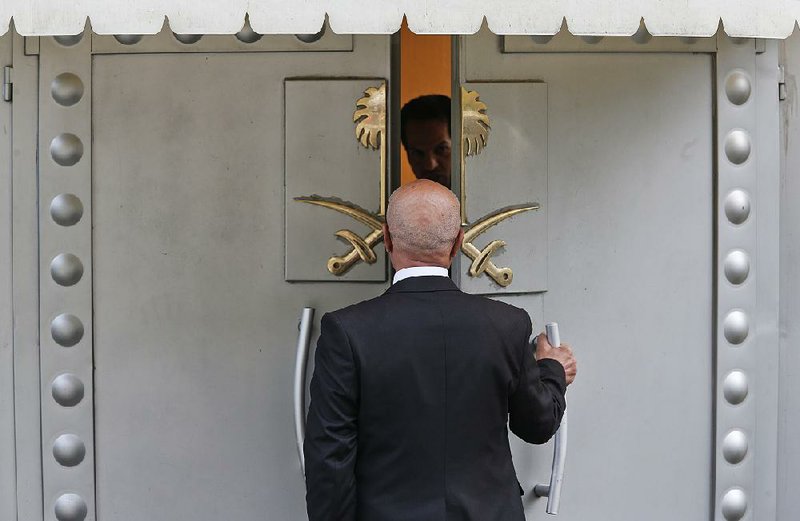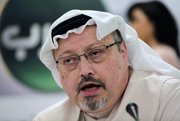BEIRUT -- Saudi Arabia said early today that Jamal Khashoggi, the dissident Saudi journalist who disappeared more than two weeks ago, had died during a fistfight with unidentified men inside the Saudi Consulate in Istanbul.
The announcement, which came in a tweet from the Saudi Foreign Ministry, said an initial investigation by the government's general prosecutor found that Khashoggi had been in discussions with people inside the consulate when a quarrel broke out, escalating to a fatal fistfight.
Eighteen men have been arrested and are being investigated in the case, Saudi state-run media reported without identifying any of them.
State media also reported that Crown Prince Mohammed bin Salman's adviser Saud al-Qahtani and Maj. Gen. Ahmed al-Assiri, the deputy director of Saudi intelligence, and other high-ranking intelligence officials had been dismissed. They did not say whether the men's firing had any connection to the Khashoggi case or whether they were being investigated for playing a role in it.
The announcement marks the first time that Saudi officials have acknowledged that Khashoggi was killed inside the consulate. Saudi officials have repeatedly said he left the consulate alive and that they had no information about his whereabouts or fate.
The preliminary investigation conducted by the prosecutor found that the "suspects" traveled to Istanbul to meet with Khashoggi because he had expressed interest in returning to Saudi Arabia, the official news agency said. Discussions that took place "developed in a negative way" and "led to a fight and a quarrel between some of them and the citizen," it said. "The brawl aggravated to lead to his death and their attempt to conceal and cover what happened."
Investigations are continuing with the 18 detainees, it said, without naming them.
"The Kingdom expresses its deep regret at the painful developments that have taken place and stresses the commitment of the authorities in the Kingdom to bring the facts to the public," the statement said.
On Friday night, President Donald Trump said Saudi Arabia's announcement is a "good first step," but what happened with Khashoggi is "unacceptable."
Speaking from a defense round-table discussion at Luke Air Force Base in Arizona, Trump said he wants to talk to the Saudi crown prince before next steps are taken. He says it's important that Saudi Arabia made arrests.
Trump said he'll work with Congress on what the U.S. response should be but that he'd prefer not to hurt American companies and jobs by cutting billions of dollars in arms sales to the kingdom.
He said the death of Khashoggi was a "horrible event" that has not gone "unnoticed."
In addition to al-Qahtani and al-Assiri, the official Saudi statement named several other senior military officials who had been fired. They included Gen. Rashad bin Hamid al-Mihmadi, Gen. Abdullah bin Khalef al-Shaiyi, and Gen. Mohammed bin Saleh al Rumaih.
Al-Qahtani has been one of Mohammed's closest advisers, serving as a strategist and enforcer. He had been referred to in some quarters as the Saudi Steve Bannon and had created a "blacklist" of online critics of Saudi Arabia.
Al-Qahtani had reached out to Khashoggi and attempted to persuade him to return to Saudi Arabia this summer, when U.S. intelligence officials said there was an attempt to lure him back to the kingdom to detain him.
"Do you think I can act by myself without taking orders/guidance?" he said in a tweet last year that was widely shared after the announcement. "I am an employee and a trustworthy executive to the orders of the king and the crown prince."
Al-Assiri, who has also been close to the crown prince, served for two years as the public face of Saudi Arabia's military intervention in the war in Yemen before his intelligence posting. Al-Assiri, who speaks fluent French and English, held regular news briefings on the state of the battle that were unusual for the Middle East and appeared designed to promote the professionalism of the Saudi war effort.
Some lawmakers in Washington expressed doubt about the credibility of Saudi Arabia's explanation.
"To say that I am skeptical of the new Saudi narrative about Mr. Khashoggi is an understatement," Sen. Lindsey Graham, R-S.C., said in a Twitter post. "First we were told Mr. Khashoggi supposedly left the consulate and there was blanket denial of any Saudi involvement. Now, a fight breaks out and he's killed in the consulate, all without knowledge of crown prince."
California Rep. Adam Schiff, the ranking Democrat on the House Intelligence Committee, said Friday that Saudi Arabia's claim that he was "killed while brawling with a team of more than a dozen dispatched from Saudi Arabia is not credible."
Schiff said if Khashoggi was fighting inside the consulate, he was "fighting for his life with people sent to capture or kill him."
He said if Trump's Republican administration won't hold Saudi Arabia accountable for Khashoggi's death, Congress will.
International anger surrounding Khashoggi's disappearance has mounted as Turkish officials have leaked lurid details from their own investigation suggesting that Khashoggi was killed inside the consulate and dismembered by a team of 15 Saudi agents who flew in specifically to meet him.
The case has battered the international reputation of the kingdom and its 33-year-old crown prince, who has sought to sell himself to the world as a young reformer shaking off his kingdom's conservative past. But suspicions that such a complicated foreign operation could not have been launched without at least his tacit approval have driven away many of his staunchest foreign supporters.
Trump's administration had built strong ties with the crown prince, seeing him as a strong partner in its ambitions to counter Iran, forge a deal between Israel and the Palestinians, and reconfigure the Middle East. But Trump said Thursday that he believed Khashoggi was dead and that the consequences would be serious for Saudi Arabia if it was determined to be behind the killing.
"Well, it'll have to be very severe," Trump said. "I mean, it's bad, bad stuff."
Big-name chief executives, investors and foreign officials, including Treasury Secretary Steven Mnuchin, have dropped out of a Saudi investment conference that the crown prince is hosting in Riyadh next week.
The Saudi announcement did not address many of the questions raised by the Turkish investigation, such as the identities of the 15 suspects in Khashoggi's killing and whether they were among the 18 people the Saudis said they had arrested.
All 15 were identified by name, and Turkish newspapers published their photographs. The New York Times established that most of them were employed by the Saudi military or security services and that at least four had traveled with the crown prince as part of his security detail.
The Saudi announcement did not say what had become of Khashoggi's body. The Turks said it was disassembled with a bone saw by an autopsy specialist flown in specifically for the purpose and was likely carried out of the consulate in large suitcases.
Turkish investigators were searching a park and a forest for traces of Khashoggi's remains today but did not announce their findings.
The reports of Khashoggi's killing had shaken members of the Saudi royal family, many of whom were angry about the crown prince's swift rise over the past three years. Some wondered if the scandal could lead his father, King Salman, to replace him as crown prince with another prince not tarnished by the case.
But instead, the king named Crown Prince Mohammed the head of a committee to restructure the kingdom's intelligence agency, suggesting that the prince is perceived to have played no role in the killing.
People with knowledge of Saudi plans told the Times on Thursday that the kingdom was planning to blame the operation on al-Assiri, the deputy intelligence director. The people said the kingdom would portray the operation as carried out by rogue actors who did not have orders from the top and who had set out to interrogate and kidnap Khashoggi but ended up killing him, perhaps accidentally.
Khashoggi, 60, was a journalist who had interviewed Osama bin Laden in Afghanistan years before bin Laden founded al-Qaida. He later served as adviser to and unofficial spokesman for the Saudi royal family.
But his relationship with the kingdom changed during the rise of Crown Prince Mohammed, who has gone after critics and cut down many of his fellow royals.
After many of his friends and colleagues were jailed last year, Khashoggi settled into self-exile in the Washington area and became a columnist for The Washington Post, a position he used to criticize the crown prince's increasing authoritarianism.
He entered the Saudi Consulate in Istanbul on Oct. 2 to pick up an official document that he needed to marry his Turkish fiancee, Hatice Cengiz. When he didn't emerge after a number of hours, Cengiz began calling Turkish officials to tell them Khashoggi was missing.
Information for this article was contributed by Ben Hubbard of The New York Times; by Kevin Sullivan, Loveday Morris and Tamer El-Ghobashy of The Washington Post; and by staff members of The Associated Press.
A Section on 10/20/2018


